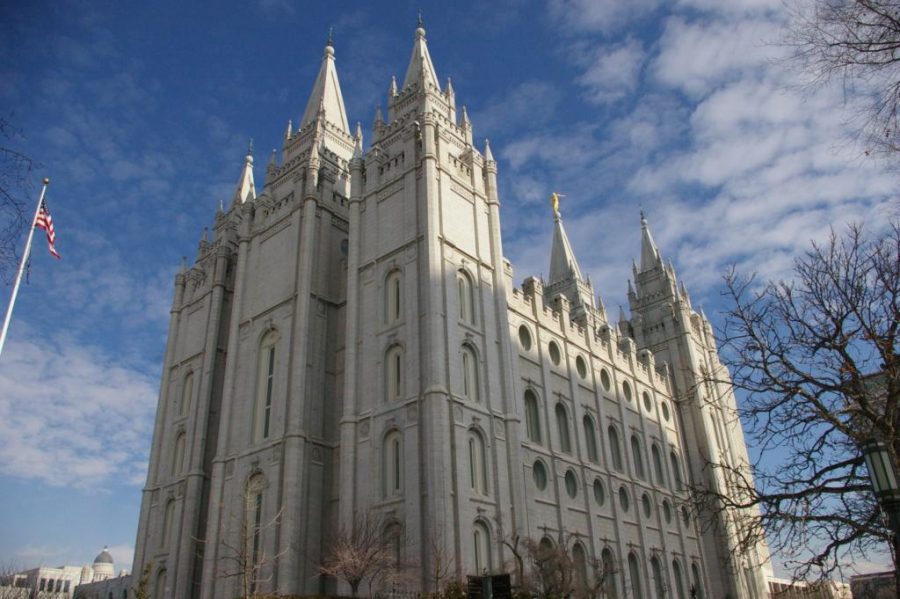
This weekend the LDS church will hold its semiannual General Conference during which church leaders deliver short talks or sermons to the 14 million LDS members that live around the world. Thanks to the wonder of modern technology, there is a website where one can search a database of these talks, starting from the 1850’s, and see how any given topic has changed over the years. Examining this data yields some interesting insights into how many LDS members’ social and political beliefs differ from what church leaders are saying.
Socialism
It’s no secret that Mormons generally lean to the right politically. A 2011 survey of U.S. Mormons by Pew Research found that 66 percent identify as conservative (while 22 percent identify as moderate and 8 percent as liberal). It’s not uncommon to find people, either in the Deseret News’ comments section, or during LDS Sunday School, saying that socialism is the biggest threat to America or that the U.S. Democratic party (which is lead by Satan, by the way) are seeking to instill socialism in the United States. If this were true, one would imagine that the leaders of the LDS church would warn its members about it.
As it turns out, the database comes up with zero results when searching for “socialism” within the last forty years. Is that because the LDS church is afraid to make statements about certain political philosophies? Not at all. Between the 1940’s and 1970’s, there were 294 references during General Conference to “communism.” The fact that modern church leaders haven’t responded similarly to the rise of democratic-socialism in Europe and within factions of the American Democratic party shows that they don’t see it as a threat to American Mormons, or the many Mormons around the world who live in “socialist” countries.
Diversity and Race
Sadly, there are a number of LDS people who have clung to some of the church’s racist past. It’s impossible to know exactly how many, though one Mormon Twitter user, Ayla Stewart, who is openly affiliated with white nationalist aspects of the alt-right has over 30,000 followers (though a lot of those may just be fake Russian troll accounts). Regardless, it’s an alarming number. But how do her views stack up against what LDS church leaders have said in General Conference?
Since 1980, there have been 53 references to diversity (presumably all in favor of it). Though not part of General Conference, the LDS church released a statement this year following the alt-right rally in Charlottesville (where Stewart had planned to speak) condemning those who “promote or pursue a ‘white culture’ or white supremacy agenda.”
Stewart disregarded the statement as a mere PR statement and challenged someone from the actual church leadership to say the same thing.
I don’t listen to the church’s PR department, have someone from the first presidency tell me I can’t love my culture, then we’ll talk. https://t.co/spnfjFkoYJ
— Wife With A Purpose (@apurposefulwife) August 16, 2017
This weekend’s General Conference will be first since the Charlottesville rally, so I wouldn’t be surprised at all if Stewart’s wish is granted and an LDS apostle denounces white supremacy and white nationalism from the pulpit.
Refugees
Despite the fact that a majority of Mormons identify as conservative or Republican, there are times when the church’s position is in direct opposition to the Republican position. The best example right now is that of the plight of refugees worldwide.
The LDS church has been attuned to this issue – there have been 27 references to refugees since the year 2000. Most notably, there was an entire talk dedicated to the issue in the April 2016 General Conference by Elder Patrick Kearon. He invoked the church’s own history as refugees and talked about his personal experiences of meeting refugees from Turkey and Syria who had travelled to a refugee camp in Greece. Of that experience, he said, “I will never be the same.” He goes on to encourage members to “take a stand against intolerance and advocate respect and understanding across cultures and traditions” and to make a point to meet refugee families who have settled in new communities. He ended by saying that these people’s refugee status does not define them, “but our response will help define us.”
Contrast that with the Republican response to the refugee crisis. Donald Trump’s administration plans to cut the admission of refugees to the lowest level seen in decades. His travel ban has sought to block refugees from some of the most war-torn parts of the Earth (many of which the U.S. is at least partly responsible for).
Many conservative Mormons, presented with this difference between their church and their political party, have sided with their party. Just take a look at the comments section for any article about refugees written by LDS-owned media organizations like KSL or Deseret News. One article by the Deseret News titled “So You Want to Help Refugees? Here’s How?” elicited the following response:
“I don’t want to help them. I want them to go home.”
“I won’t help them take our jobs, homes and be handed everything while we busy our butts to make ends meet.”
“Assisting Islamic colonists is suicide.”
I inspected the Facebook profile of those who made these comments, and all three had photos that suggest they are members of the LDS church. People like this are an embarrassment to the LDS church. In my experience, a majority of members have had a positive response to Elder Kearon’s call to help refugees. It is unfortunate that a minority has chosen to prioritize the toxic dogma of its political party over the charity and service promoted by its church.
LGBTQ+ Rights
This has been maybe the most controversial issue relative to the LDS church for quite a while now. There have been signs of progress in Utah, like the recent anti-discrimination bill passed by the legislature which prevents employment and housing discrimination based on gender identity or sexual orientation. But the LDS church has also made moves that have damaged relations between the church and the LGBTQ+ community, such as the 2015 policy change which prevented children of same-sex couples from joining the church until they are 18 years old.
Considering how many headlines this subject has had over the past ten years, it might be surprising to some how often it is brought up in General Conference and how it is treated. The database comes up with three mentions of “gay” or “homosexual” since the 1990’s. Partly, that’s because church leaders have adopted a new phrase, “same-sex attraction.” A search of that term on the church’s website returns six General Conference talks that include the phrase. Most of them emphasize that LDS members should love and respect LGBTQ people and none of them are reminiscent of the way that some Evangelical preachers openly demonize them.
Obviously, actions speak louder than words. Someone can legitimately say that LDS church leaders can talk about respecting LGBTQ+ people all they want in General Conference, but that their actions behind the scenes (supporting Prop 8 in California or supporting the Colorado baker who refused to serve a gay customer) are more impactful and more meaningful.
There are a lot of layers to this issue which make it difficult, if not impossible, to create an objective summary of how the LDS church thinks LGBTQ+ people should be treated in society generally and within the church specifically. One thing is for sure, though. Many members of the church treat LGBTQ+ people with not nearly the amount of love and respect that the church publicly encourages. Whether it’s casual homophobia exhibited by LDS youth using “gay” as a derogatory term, insensitive trans-phobic jokes or even the malicious targeted bullying of LGBTQ+ youth which so often in Utah has led to tragedy. While some will contend that certain actions taken by the LDS church are decidedly anti-LGBTQ, the church certainly doesn’t condone this kind of bigoted behavior on an interpersonal level.
Conclusion
For a long time, conservative Mormons have been able to fully occupy both those identities because their values and beliefs have almost always overlapped. Now with the rise of Trump, conservatism is becoming affiliated with many things the church opposes: vulgarity, racism, intolerance, finding entertainment in offending others and hatred of other religions just to name a few. Many Mormons will now have to choose whether to listen to their favorite Fox News host or the man they consider a prophet, because often they’re not saying the same thing.
